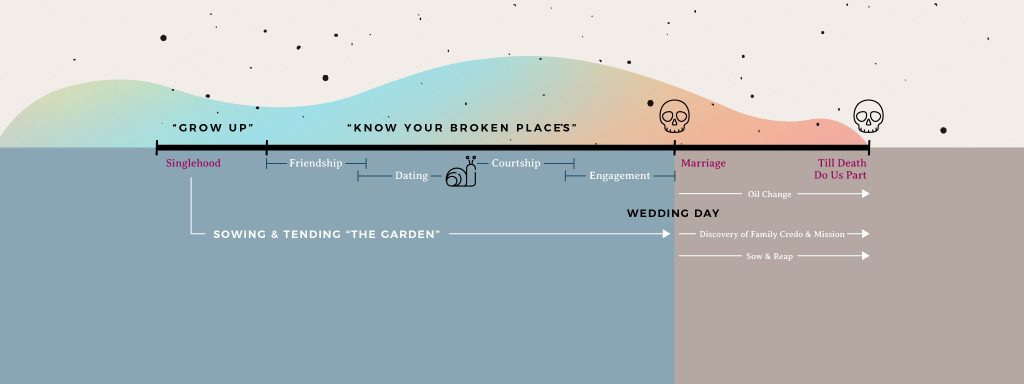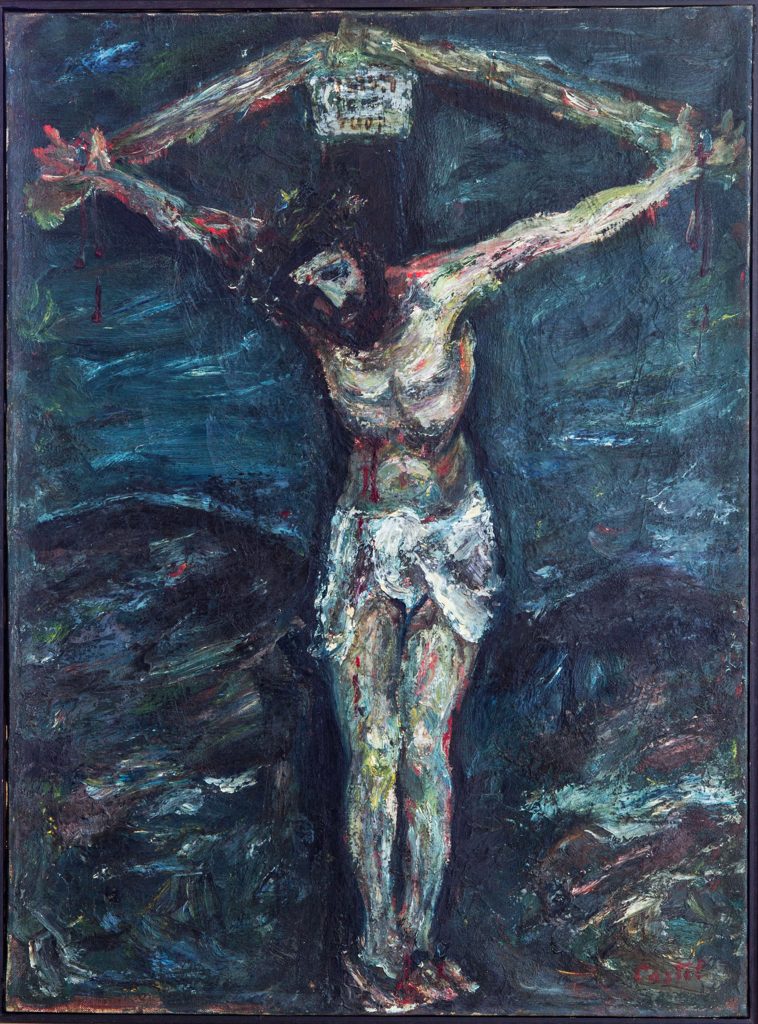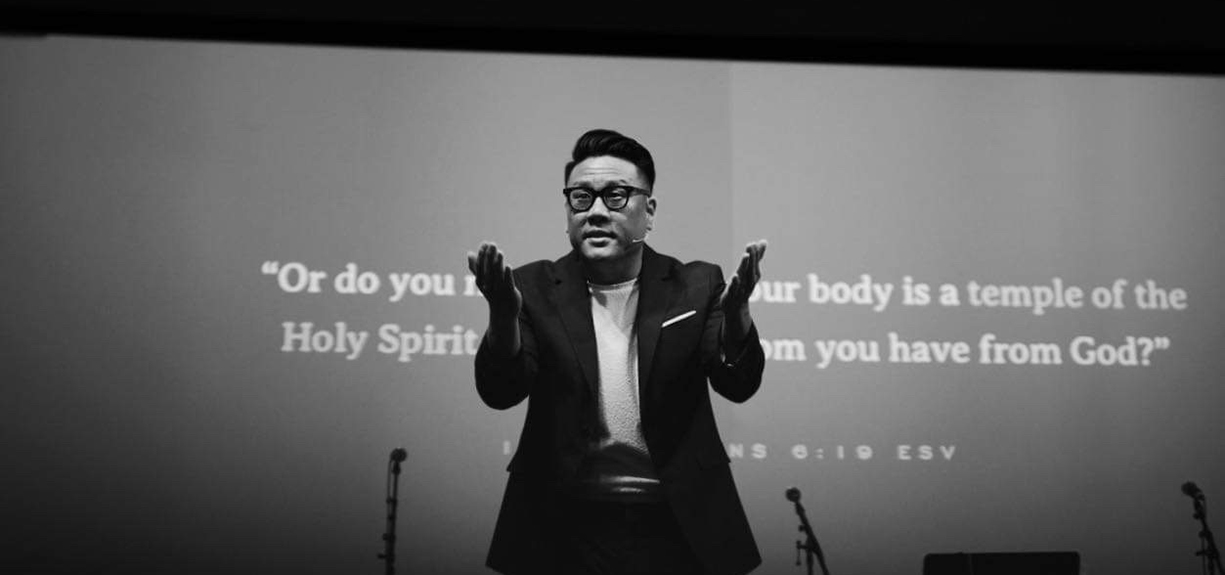How can we date wisely and well in preparation for marriage?
Dr. Neil Warren, the founder of E-harmony and the author of Finding the Love of Your Life, offers this advice after many years of study on all things relationships:
“Take it slow.”

So two ways we can take it slow during the dating season are:
- Take it slowly by taking your time
- Take it
slow ly by touching after covenant is established
Take your time by dating at a snail’s pace. This means: Don’t give your body, mind, and emotions over to the other so quickly.
How do we date at a snail’s pace?
- Meet the family members much later, preferably in the Courtship stage.
- Don’t make promises or declare undying love too early.
- Treat the relationship like an organic garden, tending to it and giving it seasons to pass through.
- Take time to really know each other: Ask questions, “What is your vocational credo?” “Where are you headed?” “Are we equally yoked?”
Take it slow by having sex only after covenant.
During the dating season, spend lots of time together. And after marriage, spend a lot of time together and spend a lot of time touching each other.
The negative impacts of pre-marital sex include:
- It destroys your witness as a Christian to your non-christian significant other.
- It fosters a disrespect for your walk with God to your Christian significant other.
- It damages friendship by creating the illusion of intimacy.
- It doesn’t allow for an organic development of godly companionship.
But why do we still engage in pre-marital sex, even if we “feel it’s wrong?”
Our theology of sex has been shaped by the world, so our behavior follows suit. We feel guilty, but we don’t know why we feel guilty. We just know as Christians that pre-marital sex is “bad.”
Here are some lies that we believe.
Lie 1A: The mind is more important than the body. The spiritual more valuable than the material (Plato).
Lie 1B (The Christian version): Mind and soul are what constitutes as the real Self, hence when I die, the Body will be left to rot with this rotting world, and the real Me will go to a disembodied paradise or heaven. (As if the body is a ‘decaying tomb’ that we will eventually be free from to go to a better place.)

But the truth is that the body is not a tomb. The body is a holy temple that God wants to inhabit.
1 Corinthians 6:19 says, “Or do you not know that your body is a temple of the Holy Spirit within you, whom you have from God?”


God cares about your body and creation. Biblical eschatology gives us a biblical view and value of our anthropology. It’s realizing that we aren’t going anywhere. Heaven is coming to us.

We are being redeemed by the resurrection and the transformation of our mind, body,
The creation narrative affirms the renewal of all things in the end. It points to God’s deep love for the human body and creation. He doesn’t want to get rid of the earth, the material, creation and our bodies. He said “It is good,” and He wants to resurrect it, renew it and give us the fullest version of it forever—as He intended for it to be.
Lie 2: Sex is bodily, and nothing spiritual or
The truth is sex always involves the whole self. Union occurs during sex, whether you like it or not.
1 Corinthians 6:15-16 says, “Do you not know that your bodies are members of Christ himself? Shall I then take the members of Christ and unite them with a prostitute? Never! Do you not know that he who unites himself with a prostitute is one with her in


The “truth about sexual intercourse: it is a sensual act with spiritual implications, a physical act with
Lie 3: My body belongs to me, for my pleasure. My body answers no one except me and my desires.
Truth: My body belongs to God, for Him, for His pleasure. I will give an account of what I did with my body. My body was purchased by God and belongs to Him.
“Do you not know that your bodies are temples of the Holy Spirit, who is in you, whom you have received from God? You are not your own; you were bought at a price. Therefore honor God with your bodies.” – 1 Corinthians 6:19-20
Truth: Our bodies also belong to our future spouses. (1 Corinthians 7:3-5)
Think about this:
Every person you sleep with, you are giving them authority over you and ownership over your heart. Make sure they give you legal authority over them as well before you sign, seal and deliver your rights over to that person.
“And now we can see clearly why Paul thought sexual intercourse by unmarried people was wrong. It is wrong because it violates the inner reality of the act; it is wrong because unmarried people thereby engage in a life-uniting act without a life-uniting intent. Whenever two people copulate without a commitment to life-union, they commit fornication… But his absolute no to sexual intercourse for unmarried people is rooted in his conviction that it is a contradiction of reality. Intercourse signs and seals — and maybe even
So this is a healthy Christian journey toward covenant and consummation.

The Christian truth is simply this: there is no Christian worship without the body’s involvement.
Christian religion involves the entire self.

Jesus gave his body. That’s why we celebrate with Communion because we have a God who gave of Himself entirely. Eucharist is not a celebration of God’s good intentions, knowledge, or special revelations. The Eucharist is the celebration of God’s love displayed when His mind, heart, and body was given completely over for us.
We are celebrating His Body and Blood.
“Therefore, I urge you, brothers and sisters, in view of God’s mercy, to offer your bodies as a living sacrifice, holy and pleasing to God —this is your true and proper worship.”
— Romans 12:1
In Marriage: It is what you do with your bodies in marriage (giving yourself over to your spouse in love, forgiveness, tenderness, sacrifice, sexual intimacy) that expresses your devotion and worship to God.
In Dating: It is what you do and
Today, let’s re-offer our bodies as living sacrifices.
“Merciful God, I present my body, a living sacrifice.”
“God, my body, a living sacrifice.”
“God, my body.”

You can listen to the sermon We’re Dating, Now What? Pt. II from the Ephesians series that inspired this post here.
All images and materials are copyright protected and are the property of EKKO Church unless otherwise noted and credited to their maker. Please do not copy or distribute without permission.
For Further Reading:
Smedes, Lewis B.. Sex for Christians: The Limits and Liberties of Sexual Living
A New Heaven and a New Earth by Richard Middleton
Surprised by Hope by NT Wright
Links
https://thebibleproject.com/videos/nephesh-soul/
